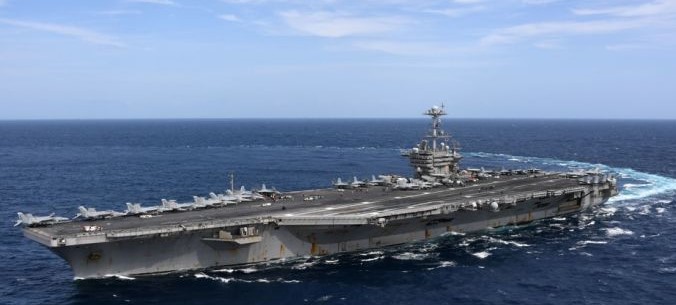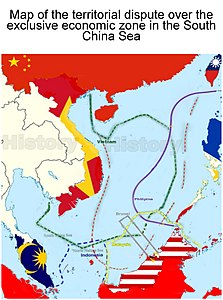
South China Sea-Wikipedia
STRATEGIC ASSESSMENT. Assistant Secretary Kritenbrink met with senior officials in the Foreign Affairs Ministry, the Economic Affairs Coordinating Ministry, and the Maritime Affairs and Investment Coordinating Ministry.
During his meetings, he reaffirmed the United States’ commitment to strengthening the U.S.-Indonesia Strategic Partnership, including cooperation across a range of issues including economic, security, climate, and energy initiatives.
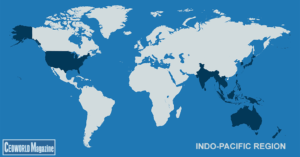
U.S. Assistant Secretary of State for East Asian and Pacific Affairs Daniel J. Kritenbrink said that the ASEAN-U.S. Dialogue held in Jakarta on March 7 and 8 demonstrated the strong U.S. commitment to the Indo-Pacific region, a comprehensive strategic partnership with ASEAN, and support for the ASEAN Outlook on the Indo-Pacific (AOIP).
ASEAN collectively represents the world’s fourth-largest economy, Kritenbrink noted, and emphasized both U.S. readiness to partner with ASEAN and U.S. support for Indonesia’s chairmanship.
On Myanmar, Kritenbrink said he believes ASEAN can make positive changes, set realistic targets, and encourage the immediate implementation of the ASEAN Five-Point Consensus by the military junta.
Representatives of the illegal Myanmar military junta have been invited to attend the ASEAN Regional Forum (ARF) Workshop on Anti-Money Laundering and Countering the Financing of Terrorism this week, according to a Justice for Myanmar source. The workshop is set to take place in Bali co-chaired by the European Union, Indonesia, and Laos, with apparent financial support from German development agency GIZ.
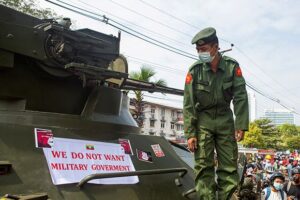
According to Justice for Myanmar spokesperson Yadanar Maung, it is nonsensical for ARF to invite representatives of the Myanmar junta, a terrorist organization, to a workshop on countering the financing of terrorism. He said the invitation not only legitimizes the junta but also provides it with an opportunity to circumvent anti-money laundering and terrorist financing measures.
The Assistant Secretary discussed progress on a range of initiatives to help Indonesia transition to a cleaner, greener energy system, including the Partnership for Global Infrastructure and Investment, the Just Energy Transition Partnership, and Indonesia’s participation in the Indo-Pacific Economic Framework for Prosperity.
The United States is considering establishing a new framework to boost nuclear deterrence against North Korea with Japan and South Korea, sources with knowledge of the plan said.
The U.S. government has already sounded out its two major Asian allies about the idea, which comes as North Korea ramps up its development of long-range missiles and nuclear weapons, according to the sources.
Japan is poised to accept the U.S. proposal, the sources said, while South Korea is believed to be ready to do the same. The United States already regularly discusses “extended deterrence” relying on its nuclear forces and conventional military capabilities with the two countries bilaterally. But there has been no trilateral framework for U.S. officials to do the same.
United States Assistant Secretary of State for East Asian and Pacific Affairs Daniel Kritenbrink has said the US is looking forward to a legally binding Code of Conduct (COC) in the South China Sea, as ASEAN states and China prepare to resume negotiations.

He said the US stood for freedom of navigation, freedom of flight, unimpeded lawful commerce and peaceful resolutions of disputes across the South China Sea, adding that disputes in the region should be settled under international law.
Kritenbrink is in Indonesia for a three-day visit before flying to Malaysia on Thursday evening. He made the statement during a press briefing at the US Embassy in Jakarta
U.S. Assistant Secretary of State for East Asian and Pacific Affairs Daniel J. Kritenbrink will travel to Jakarta, Indonesia, and Kuala Lumpur, Malaysia, on March 7 to 11, according to a press release issued by the U.S. Embassy in Jakarta.
During his trip, Assistant Secretary Kritenbrink will participate in the ASEAN-U.S. Dialogue and the ASEAN East Asian Summit Senior Officials Meeting in Jakarta.
While in Jakarta, the Assistant Secretary will also commemorate the 10th anniversary of YSEALI, and meet with the new Philippine Permanent Representative to ASEAN. He will also meet with Indonesian government counterparts to discuss the U.S.-Indonesia Strategic Partnership and bilateral economic, security, climate, and energy initiatives.
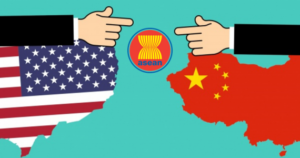
Indonesia and other ASEAN members want a code of conduct for the disputed South China Sea to be “effective, substantive and actionable,” the country’s foreign ministry said after talks this week with China and other Southeast Asian nations over the disputed waterway.
Remarks by Sidharto Suryodipuro, a director at the Indonesian Foreign Ministry, came after a senior U.S. diplomat called for a binding code of conduct for the South China Sea that follows international law.
“We do not want it to just be a document where we agree for the sake of agreeing,” Sidharto, the ministry’s director for ASEAN cooperation, told reporters after a three-day meeting between senior Chinese officials and the Association of Southeast Asian Nations (ASEAN). “The COC [code of conduct] has to be effective, substantive and actionable,” he said.
Israeli Foreign Affairs Minister Elie Cohen is attempting to normalize ties with Mauritania, Somalia, Niger, and Indonesia, according to an Israel Hayom report.
According to the news story, efforts to normalize Israeli relations have also involved Israeli Prime Minister Benjamin Netanyahu and two influential U.S. government figures, including Secretary of State Antony Blinken and National Security Advisor Jake Sullivan.
The latest data on China’s foreign trade from the General Administration of Customs (GAC) report published by Xinhua News Agency shows that ASEAN remains China’s largest trading partner with a two-way trade rate of 951.9 billion. yuan or up 9.6 percent year-on-year.
This amount accounts for 15.4 percent of China’s foreign trade. After ASEAN, the European Union is China’s second largest trading partner with a bilateral trade level of 851.1 billion yuan.
In contrast to ASEAN which rose, trade with the European Union actually fell 2.6 percent. Not only trade with the EU fell, but also with the United States. Sino-U.S. trade fell 10.6 percent year-on-year and stood at only $101.2 billion.
Australia’s prime minister said he would soon meet President Joe Biden in the United States, where they are expected to unveil a nuclear submarine deal aimed at countering China’s growing assertiveness in the Pacific.
After 18 months of negotiations, it is anticipated that Australia will reveal plans to obtain eight nuclear-powered submarines, in what Prime Minister Anthony Albanese has called “the single biggest leap” in defense capability in the country’s history.
The deal is part of the fledgling regional security pact involving Australia, the United Kingdom and the U.S. known as AUKUS. “I’ll be meeting with President Biden in the United States. We’ll have further announcements about details soon about the arrangements that will be taking place,” Albanese told reporters.
Chinese Foreign Minister Qin Gang at the annual parliamentary meeting in Beijing said that China hopes ASEAN avoids competition for power among major powers. He claimed that the U.S. Indo-Pacific strategy was an attempt to form an “exclusive clique” that harmed the interests of regional countries.

Any attempt to encircle Beijing, according to Qin, would fail. He said the leaders of several countries have stated that ASEAN should not be used as a proxy for any party and should be free of big power competition.
Chinese Foreign Affairs Minister Qin Gang, who was China’s former ambassador to the United States, repeatedly criticized U.S. confrontative actions against China, in his first official press conference as minister.
The Chinese government believes that if the United States does not immediately change its strategy in establishing relations with it, conflict between the two superpowers will be difficult to avoid and could have dire consequences.
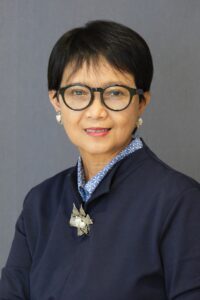
Indonesian Foreign Affairs Minister Retno Marsudi met Secretary of State Antony J. Blinken in New Delhi, India, on the sidelines of the G20 Foreign Ministers’ Meeting.

In a follow-up to their Feb. 16 conversation, Blinken and Marsudi highlighted U.S. cooperation with ASEAN during Indonesia’s ASEAN chair year and Indonesia’s leadership on the issue of women and girls’ education in Afghanistan. They also discussed regional and global security challenges, including the ongoing crisis in Myanmar.

According to Blinken, this year is a good opportunity to compare notes both on the G20, on ASEAN, as well as the very strong strategic partnership between Indonesia and the United States on the many, many issues of common interest and common concern. Minister Retno expressed gratitude to the United States for its strong support during Indonesia’s G20 presidency last year.
Finance Minister Sri Mulyani, on her Instagram on Friday, said U.S. Secretary of Treasury Janet Yellen praised Indonesia’s G20 presidency in 2022, during a bilateral meeting in India some time ago.

In the meeting, the two also discussed several issues, including the latest economic developments in the two countries, international financial support mechanisms to help countries make energy transitions and follow-up Just Energy Transition Partnership (JETP) for Indonesia, and the sustainability of potential utilization of pandemic funds.
The United States, Japan, India, and Australia — the Quad — expressed concern Friday over the militarization of Asia’s waters, in a veiled reference to China’s growing presence in contested seas.
U.S. Secretary of State Antony Blinken and the foreign ministers of the other three nations assembled in New Delhi under the auspices of their Quad grouping.
In a joint statement issued by host India, the Quad called for “the importance of adherence to international law” in the East and South China Seas “to meet challenges to the maritime rules-based order.”
Leaders of Japan and the Association of Southeast Asian Nations will formally elevate their ties to a “comprehensive strategic partnership” in December during a special summit commemorating their 50 years of friendship and cooperation, the chief of the regional bloc said Monday.
The plan comes as the United States and China increasingly vie for influence in Southeast Asia. It follows both countries upgrading their ties with ASEAN to a comprehensive strategic partnership — China in 2021 and the United States in 2022.
On February 13, Timor-Leste’s Prime Minister Taur Matan Ruak met his Indonesian counterpart President Joko “Jokowi” Widodo in the Indonesian satellite city of Bogor, home to one of the country’s many presidential palaces.
It was from such palaces that Indonesian presidents once exerted political control over the former province of East Timor, which eventually split from Indonesia and officially became independent in 2002 after 24 years of occupation.
The two countries signed off on several agreements to expand economic cooperation and improve technical cooperation in industry and higher education. They also reaffirmed their existing collaboration in the banking, energy, and telecommunications sectors. Importantly, Jokowi announced that Indonesia was in the process of drawing up a “full road map” for Timor-Leste’s admission as ASEAN’s 11th member state.





